Issue No.13 / September 16,2015
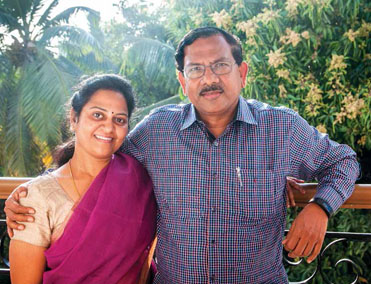
Latha and K Pandiarajan, founders of Ma Foi Management Consultants, India’s first and largest internationally acclaimed human resource management company, are based out of Chennai. Founded post the 1991 economic liberalisation, Ma Foi initially focused on placing middlelevel managers in the Middle East. It then started offering all the businesses under HR Services which made them the No.1 HR services provider in India. In 2002 they partnered with the Dutch HR Company, Vedior which took a majority stakes in them. This helped them to expand in various countries and they had 70 offices in India and had their presence in 18 countries. In 2007 Randstad acquired Vedior for US$5.14 billion and hence Ma Foi became a part of Randstad and Pandiarajan remained the Chairman till 2012.
An XLRI alumnus of the 1984 batch, Pandiarajan worked for various assignments in the Middle East and Singapore before he, along with his wife, Latha, started Ma Foi.
In 2012, this dynamic couple launched a new venture focusing on management consulting and education - Ma Foi Strategic Consultants Pvt. Ltd., to help companies in the SME sector to scaleup.
In 2000, Pandiarajan joined the Bharatiya Janata Party, but later shifted to the DMDK Party founded by actor turned politician Vijayakanth. He contested the 2011 Tamil Nadu legislative assembly elections and won the Virudhunagar constituency seat.
Last month, the Rajans announced their second ‘avatar’ in the HR industry through a new entity, CIEL HR Services. The company, based in Bengaluru, will provide HR solutions leveraging technology and analytical strengths. CIEL is a French word meaning ‘sky’. Indeed, the sky is the limit for the enterprising and energetic Rajans!
Corporate Citizen speaks to this dynamic couple who have been the most successful peoples’ people of the corporate world.
What do you say of a couple who began an enterprise with a mere Rs.60,000 which has metamorphosed it into an internationally acclaimed Rs. 1,000 crore human resources empire -- the first such in India -- and stayed together in utter harmony with each other?
Meet Latha and K Pandiarajan, pioneers in mammoth recruitments, founders of the famed ‘Ma Foi’.
Latha, a fresh Chartered Accountant, was an auditor for a subsidiary of British Oxygen Company (BOC), in Nagpur. K Pandiarajan, a fresh graduate from XLRI, worked for BOC in Kolkata but often visited the Nagpur office. They knew each other through a family friend and steadily developed a close friendship during Pandiarajan’s official visits to Nagpur. Love blossomed, leading to the nuptial knot in 1989.
It is not surprising that Pandiarajan fell hook, line and sinker for Latha, as her pleasant disposition, passion for music and charming smile wins anyone who meets her. If she terms Pandiarajan as a ‘workaholic’, he in turn refers to Latha as a person ‘with a deep passion and compassion’.
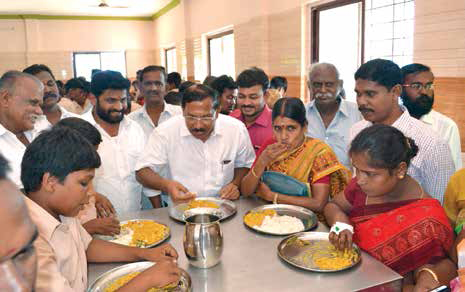
Pray, what is the secret of their successful marriage of over two decades? Latha quips with a twinkle in her eyes, “Ma Foi has kept our marriage going; may be it would have fallen apart otherwise.” Elaborating further she states, “The kind of pressure he used to work under, which entailed at least 20 days travel would have been hard for me to understand if I was an outsider. Being a part of Ma Foi I could understand the reason and necessity for his absence.’’
States Pandiarajan, “While there is a lot more gender balance in the corporate world today than when we launched Ma Foi, I find that a husband-wife combo, where both are 24x7 with each other is a rarity. It requires courage to have your spouse as your business partner. I think marriage partnership should be all about mutual inclusiveness and not mutual compartmentalisation.’’
Latha terms her childhood as a ‘nomadic’ life, what with her father employed in the Railways. Says she, “I spent my childhood in Chennai, Kolkata and Nagpur, depending on my father’s postings. So, I studied CA for a career and wanted to work for a company - entrepreneurship never crossed my mind.” Immediately after her marriage, she worked for Billimoria in Kolkata. “My ambition was limited to being a successful chartered accountant,” she says.
In sharp contrast, Pandiarajan was born in a small village – Villampatti near Sivakasi in Virudhunagar district of Tamil Nadu. Says he, “I was three months old when my father, who was a worker in a match box factory, died. So, my mother returned to her maternal home and my grandfather became my source of inspiration. It is a village where entrepreneurship commands a high social status – even if you are earning Rs.one lakh as a professional, you are still not respected. My grandfather was a thorough entrepreneur – he started his career as a cook to a prominent doctor in Chennai, Dr. Santosham. When the doctor joined politics, he bid good bye to my grandfather, gifting him a handsome amount of Rs.5000. He used this money to start a factory called Pandiarajan – after me -- and that’s how I had a tryst with entrepreneurship at an early age,” and adds cheekily, “without me contributing anything to it.”
While Pandiarajan secretly nurtured entrepreneurship ambitions, he got a golden opportunity for global exposure when he joined V Krishnamurthy, the doyen of BHEL and SAIL, after he quit his job in BOL, soon after marriage. States Pandiarajan, “Krishnamurthy was running a number of companies in the South. He was then chairman of BHEL and AK Nandi was the director. One of the companies was called IDEA which focused on engineering consulting. I was handling the HR of this group at that point of time. That gave me phenomenal breaks, as I moved around the world and got exposure to HR and marketing. Finally, I was posted in Singapore to penetrate that market. However, that was a time of political turmoil and turmoil within the company. We decided to move out and create something on our own.
There is a lot more gender balance in the corporate world today, but I find that a husbandwife combo, where both are 24x7 with each other is a rarity. It requires courage to have your spouse as your business partner
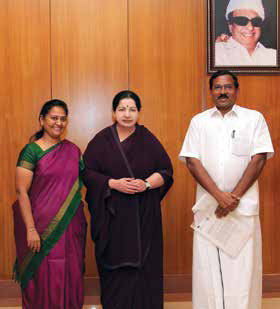
Says Latha, “After marrying Pandiarajan, my mindset of staying a professional, steadily got weaned off and we had decided while we were still in Kolkata that someday we should start something on our own. But if we ever start something, it would be down South where we belonged. Thus we moved to Chennai after the Singapore stint.”
The decision was made to set up a Human Resources Consultancy company, but what would it be called? Says Latha, with a twinkle in her eyes, “We wanted a global kind of name, so settled for Ma Foi which means ‘my word’ in French. Adds Pandiarajan, “Thanks to this tongue twister, people pronounce it in multiple ways. We were also called the mafias, jocularly.”
So how did they start this venture which was relatively new? “Multinationals like Apple, Monsanto and others were all coming into India. There was the need for good and robust placement consultancy, now known as professional HR services. Our vision was that if you start with a base of Rs. five lakhs and achieved 100 percent growth every year, in the 20th year you had to be a RS.1000 crore-plus company.” Adds Latha, “We had taken money from friends, relatives, colleagues who helped us with sums ranging from Rs 5000 to Rs.20 lakhs and given them shares, with a clear commitment that we would give them 20 per cent dividend every year. We worked very hard but kept this commitment.”
The Pandiarajans say they are grateful to all the people who showed trust in them by putting in money, as they would never have got a head-start without them. For, he rues, being a human capital-centric company, banks refused loans outright. Banks, he said, told him point-blank that they were okay giving loans to buy 20 buffaloes since they would not run away, but what guarantee was there that people would not run away? Adds Latha, “A Human Resource company was a new concept, so banks hesitated. After our success though, there used to be a line of bankers wanting to give us loans when we did not really want them.’’
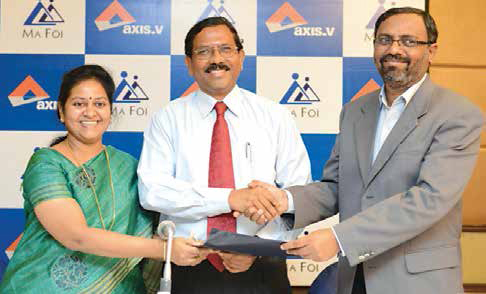
“The First Phase of eight years we co-created Ma Foi with pure entrepreneurship, raising funds from friends, relatives, clients, and employees. These were the four constituents we had raised funds from, and expanded the company from Chennai to Bengaluru, Hyderabad, Baroda, Calcutta, Delhi, Pune, Mumbai, Ahmedabad and Dahisar. These were our ten ‘mother centres’ through which we worked with multinationals. We generated 70 percent of the revenue from fortune 500 companies. For example Apple Computers, a $ 700 billion company came to India and we recruited the entire team for them. When Monsanto came, we did all the recruitment for them. And when the BPO boom happened, we were there, at the start. When HSBC wanted to do the back office, 2000 people were recruited by us. In a sense, we were the pioneers in professional recruitment.
“We also embarked on the deputation business – staffing, as it came to be later called. We had companies asking us to depute a set of teams – for Unilever for example, where 5000 people were deputed across 400 locations. That’s the range of work we did and we kept on growing in scale, in scope and in depth. As for scale, as we had envisioned, we went up from RS five lakhs in the first year to a Rs. 1000 crore company in the 20th year. In our industry, we were the first in the country to do Rs. 10 crore plus, first to do RS. 100 crore plus and the first to do Rs. 1000 crore plus. Our primary business was permanent recruitment, the second was a variant of permanent recruitment called executive search, the third was staffing, and the fourth was payroll processing (first in the country to do payroll processing), where we basically took over a company’s payroll processing responsibilities. Citibank was the first company in this country to outsource payroll processing to us, followed by Standard Chartered Bank and several others. Finally we sold that part of the business to ADP, a payroll processing company.
‘She always says we have three children– daughter, Sunila son, Suhaas and Ma Foi.’
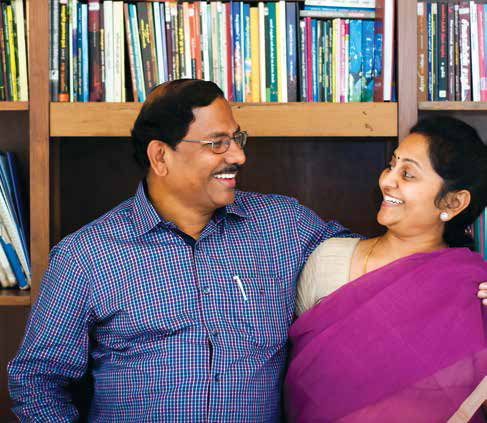
“After our return, we collectively took RS. 8.5 crores from three people and offered them 26 percent interest per annum. That gave us a big opportunity to grow. We were the first in the country to get into dotcom by starting mafoi.com, a portal which had eight sites corresponding to eight sub sectors of HR - segmented testing, compensation benefits, permanent recruitment and so on. We were ahead of our time, when the internet penetration was hardly one percent in India. After two years of our getting in, Naukri. com came. From March 2000 to March 2001, 15 such companies came in and took funding. Venture capital was on a high, but March 2001 onwards the dotcom got busted, and 13 of these 15 companies died month by month. Only two survived -- Ma Foi and Naukri.
“Our business got rewritten, several times. We went into career and skills training and created the Ma Foi academy. Training for employability was another vertical we created. We created HR consulting which involved a range of consulting services in HR. At that time we also got into HR research and were the first in the country to create a research group and came up with many psychometric test products. We also ventured into HR automation and created a separate IT company. This was the second phase, which I would call the Venture Capital growing phase. We created three international offices in Singapore, Dubai and London. We believed that we should create an expertise corridor, wherever Indian expertise could go and come back. We created around 18 sub-centres around the world and that was the time we realised that we should link with international companies, so we found Vedior, a listed company based in the Netherlands. We became part of Vedior, which defined itself as a configuration of entrepreneurs. They had similar entrepreneurs like us around the world in 51 countries, of which it was a configuration. That was the big transition that happened in 2004.
“The third phase was the Vedior phase, the time we really went international. We created seven offices in the Middle- East, five offices in South East Asia - Singapore, Malaysia, Thailand, Hong Kong and China in Shanghai and also in the USA and UK. Wherever expertise would migrate to and migrate from, was the logic we went along with. Along the way Vedior got acquired by Randstad, again a Dutch multinational, but Randstad went by the fundamental belief of one company, one culture, and one brand. They re-defined Vedior as the least known Euro nine billion multinational. Randstad already had two companies in India, which they had acquired prior to the acquisition of Vedior. The integration took almost a year and by 2010 December, we sold our shares to Randstad. I continue to be its chairman.
“The fourth phase began a year later. In January 2012 we created four businesses - Ma Foi Strategy, Ma Foi Education, Ma Foi Connecting Dots, and Ma Foi Analytics .
“Ma Foi Strategy is into strategic consultancy and advice, getting small companies grow larger, working with them to respond, working with them to figure out operation strategies.
“Ma Foi Connecting Dots does manufacturing and supply chain consultancy, where we work with companies like Tata, Mahindra, to streamline their vendor ecosystem. Another niche involvement of Connecting Dots is in aerospace, after the Indian government came out with the new Defence Offset policy. When we buy an aircraft or defence equipment from overseas, 30 to 50 percent of that value has to be procured from India. It is like the Make in India policy. Anybody who runs a component company would want to migrate into aerospace, and we help them with the migration and the business plan. We have also tied up with the Tata Institute of Social Sciences, where we work in the ‘location excellence’ part of their business. Ma Foi Connecting Dots is located in Delhi, Chennai, Mumbai, Madurai and Coimbatore.
“Ma Foi Analytics has been largely focusing on sales and marketing analytics. We created a new office in Dallas, USA. In India we have presence in Chennai and Bengaluru.
“Ma Foi Education is our recent setup, into e-learning. We have also started management development programmes (MDP) closer to HR. Our plan is to create an institution. It is an e-learning and MDP programme for corporates, which we conduct at companies, and at hotels when there are public programmes.
“The fifth phase belongs to Varam Capital Pvt..Ltd which we have newly created. It is a new generation Micro Finance Institution (‘MFI’) with a vision to catalyse the economic empowerment of households that operate at and around the base of the pyramid and thus usher in a brighter future for these households. Varam is one of the 48 registered NBFC – MFI’s in India. We have also formed the Sornammal Education Trust (SET), which runs the Sornammal Education School in Chennai for the underprivileged. Over the past 10 years SET has promoted 3500 SHGs with 60,000 members, who have availed over Rs. 80 crores in credit with a current outstanding close to Rs. 35 crores. SET was awarded by ICICI Bank for achieving the highest volume of credit under the ICICI NGO Partnership Model, with 100 percent recovery. Another of our NGOs is Ekam, which works in the health care sector – for this, we are working with the National Rural Health Mission in three states, including Maharashtra and Chattisgarh. The third is Ma Foi Foundation, where we have created the brand Disha, which mainly works for empowering under privileged children in education and sports. We have supported more than 4000 children of which 300 have already taken up jobs, 1500 are in colleges and the rest are in schools.
“We have also created a small network for NGOs called the Confederation of Indian Organisations for Service & Advocacy (CIOSA). That’s a network of about 250 NGOs in Tamil Nadu and a very powerful voice in the NGO sector.”
Last month, the Pandiarajans announced CIEL HR Services, to provide HR solutions leveraging technology and analytical strengths, based in Bengaluru. CIEL is again a French word, meaning ‘sky’. It comprises of two companies – CIEL HR Services for HR solutions and CIEL IT Solutions for IT requirement.
By the time they left Ma Foi in 2012, as Pandiarajan proudly says, “We had generated careers for around 4 lakh people, in about 36 countries, mostly in large multinationals. Our own employees numbered 2000 people and at one point we were interacting with almost 72,000 people located physically over 450 locations in India and 14 other countries.”
The culture of Ma Foi was to serve as key role models to every member of the team. “We had the Employee Stock Option Plan (ESOP) scheme, allowing employees a stake in this company. The other aspect was the human interaction with over one crore people who trusted us, day after day. It is extremely important how you handle that trust. Ma Foi even today maintains the highest visible rank in HR services.”
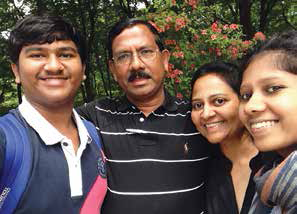
Counters Pandiarajan, “She always says we have three children – our 24 year old daughter, Sunila, our 17 year old son, Suhaas and Ma Foi. Her key strength is the intense attachment she had for Ma Foi – she became the anchor of the Ma Foi culture. Her ability to understand, accept and forgive is very strong. I am a bit of a detached person and my excitement lies in the scope and scale of the business.”
Adds Latha, “The larger perspective and the larger goals are quite similar. My daughter just finished her postgraduation from King’s College in London after pursuing visual arts at graduation. My son in the 12th grade and wants to pursue aeronautical engineering.
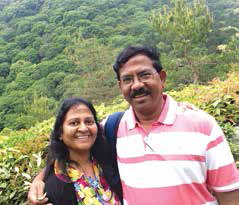
“Politics is a very important and a powerful tool for change. But dealing with the internal dynamics of a party is difficult for a person like me who is used to the organised system of the corporate world. One small intervention can a make huge difference, but along with it comes the dynamics of party politics. Ultimately, 80 to 90 percent funds and decisions for proposals and projects go through the political process, so you can do a lot, but the constraint is party politics.”
He contested the 2011 Tamil Nadu legislative assembly elections from the Virudhunagar constituency, and won. Says Pandiarajan, “I was not deterred by losing elections in 2001. I started working for my constituency, focusing on basic amenities like water for households and schools. With the firecracker industry dominating the area, accidents were common, so I focussed on the rehabilitation of victims and safety aspects of this cottage industry. I spent two days a week here and appointed people to oversee the work. My hard work paid off ten years later.”
How does Latha see him as a politician? “It is an extension of our social work, though it takes a lot to manage the constituency. Each one has a different expectation and sometimes you feel you have done so much and yet so little. However, I have campaigned vigorously for him and enjoyed every bit of it.”
Her ability to understand, accept and forgive is very strong. I am a bit detached; my excitement lies in the scale of business
Narrating an incident, Latha states, “Campaigning for elections was a great learning experience for me. I remember, once we went to a very small village, where all the women worked in the match factory. While we were talking to them about higher studies for their children, one woman got up and suggested that we should visit her house and look at the sanitation level and water shortage first. I saw that there was a huge disconnect -- what they really needed in life and what we were promising.”
“At times,” says Pandiarajan, “your qualification becomes an obstacle in politics. So holding together the corporate world, the social sector and the political world has not been that easy.’’
Latha agrees being a working woman is a challenge: “It is challenging, but possible. The support system of the family and people around you can make it easier for women. Ultimately what you want out of life is very important, and that you have to answer yourself. In a sense, entrepreneurship gives flexibility as you can manage your timing as per your priorities and convenience. What you create, the growth of your business and people around you gives a deep sense of satisfaction. So that has been really good for me as a woman entrepreneur and could work well for others too.”
By Vinita Deshmukh